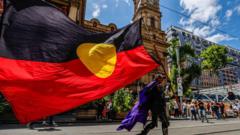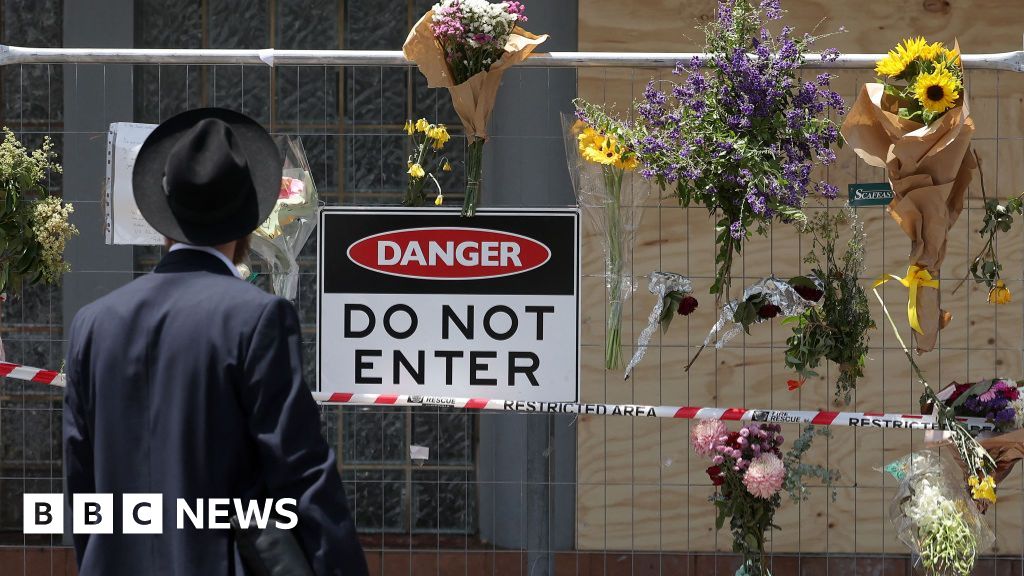In the heart of Yarrabah, Queensland, a stark absence of electoral noise foreshadows lingering issues for Indigenous Australians. As the nation approaches an impending election, the silence from political leaders about Indigenous concerns is striking. Suzanne Andrews, the chief executive of Gurriny Yealamucka Health Services, shared her frustrations, noting the glaring omission of Aboriginal issues during the leaders' debates. Indigenous Australians, who account for about 3.8% of Australia's 26 million population, face significant socio-economic disadvantage. However, both Prime Minister Anthony Albanese and Opposition leader Peter Dutton seem hesitant to address these topics.
The lone mention of Indigenous matters came from Dutton, who criticized "welcome to country" ceremonies as excessive, highlighting a culture war rather than genuine concern for Indigenous issues. Experts indicate that the defeat of the 2023 Voice to Parliament referendum, which aimed to recognize Aboriginal and Torres Strait Islander peoples in the constitution, has led political parties to avoid potentially divisive topics.
Andrews reflects on the referendum's fallout, lamenting a political landscape that now appears focused on avoiding uncomfortable discussions. Prominent figures across the political spectrum recognize the need for continued dialogue; however, they agree that both sides have disengaged since the referendum, leaving Indigenous policy off the election agenda entirely.
Independent senator Lidia Thorpe criticized Albanese for his reluctance to engage with Indigenous issues post-referendum, commenting that previous elections at least acknowledged Aboriginal concerns. She advocates for a legally binding treaty rather than attempting to amend constitutional recognition through votes.
Despite ongoing struggles with poverty and discrimination—emphasized by the persistent issues tracked by the government's Closing the Gap strategy—political attention remains scarce. Meanwhile, Aboriginal advocates face a distressing reality, citing an uptick in racist incidents and backlash surrounding the referendum's intense debates, causing emotional turmoil in their communities.
With political candidates opting for silence, many Indigenous Australians are choosing to withdraw from a process they view as unresponsive to their needs. The path to improving conditions for First Nations peoples appears clouded as critical conversations remain unaddressed, shedding light on a national disappointment that echoes through the silence of the electoral campaign.
The lone mention of Indigenous matters came from Dutton, who criticized "welcome to country" ceremonies as excessive, highlighting a culture war rather than genuine concern for Indigenous issues. Experts indicate that the defeat of the 2023 Voice to Parliament referendum, which aimed to recognize Aboriginal and Torres Strait Islander peoples in the constitution, has led political parties to avoid potentially divisive topics.
Andrews reflects on the referendum's fallout, lamenting a political landscape that now appears focused on avoiding uncomfortable discussions. Prominent figures across the political spectrum recognize the need for continued dialogue; however, they agree that both sides have disengaged since the referendum, leaving Indigenous policy off the election agenda entirely.
Independent senator Lidia Thorpe criticized Albanese for his reluctance to engage with Indigenous issues post-referendum, commenting that previous elections at least acknowledged Aboriginal concerns. She advocates for a legally binding treaty rather than attempting to amend constitutional recognition through votes.
Despite ongoing struggles with poverty and discrimination—emphasized by the persistent issues tracked by the government's Closing the Gap strategy—political attention remains scarce. Meanwhile, Aboriginal advocates face a distressing reality, citing an uptick in racist incidents and backlash surrounding the referendum's intense debates, causing emotional turmoil in their communities.
With political candidates opting for silence, many Indigenous Australians are choosing to withdraw from a process they view as unresponsive to their needs. The path to improving conditions for First Nations peoples appears clouded as critical conversations remain unaddressed, shedding light on a national disappointment that echoes through the silence of the electoral campaign.



















